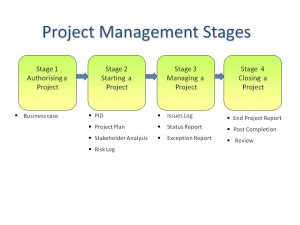Project Management
“All things are created twice; first mentally; then physically. The key to creativity is to begin with the end in mind, with a vision and a blue print of the desired result.” — Stephen Covey
 Whether it’s a full scale production like the Olympics, or planning with your brother to do a half marathon as I did last year to get fitter and raise money for charity, it’s a project. A staggering number of projects fail in organisations, or succeed but are wildly over initial budget. All projects are risky, whether it’s the impossibility of delivering the business case, or the change is too great. I was involved in a national heart disease prevention campaign 20 years ago which promised huge reductions in mortality and morbidity, but even though the targets were set in good faith, there was a weather eye on funding and making high predictions to support the case!
Whether it’s a full scale production like the Olympics, or planning with your brother to do a half marathon as I did last year to get fitter and raise money for charity, it’s a project. A staggering number of projects fail in organisations, or succeed but are wildly over initial budget. All projects are risky, whether it’s the impossibility of delivering the business case, or the change is too great. I was involved in a national heart disease prevention campaign 20 years ago which promised huge reductions in mortality and morbidity, but even though the targets were set in good faith, there was a weather eye on funding and making high predictions to support the case!
Its usually helpful for a team or indeed an organisation to differentiate between processes (the systematic execution of repetitive activities) and projects, the one time execution of more or less unique activities. In today’s world, one off projects are gaining more and more importance for various reasons including the need for innovation and nimbleness due to fast paced competition, the need for more customisation in response to customer needs, and constant re-structures and mergers. Our current environment requires constant change, and implementing change requires the need to manage projects.
Uncertainty is built into every project, since each one is unique and complex, based on assumptions and dependencies, and delivering change through people. Although the degree of risk might vary, the zero-risk project does not exist. This means that the probability of success for any project is less than 100%, so there is always the possibility of failure. If you google statistics on project failures, there are some impressive failure figures!
What is a project?
 Project management is the discipline of planning, organising, and controlling resources to achieve specific goals. A project is a temporary endeavour with a defined beginning and end (usually time-constrained, and often constrained by funding or deliverables), undertaken to meet unique goals and objectives, typically to bring about beneficial change or added value. The temporary nature of projects stands in contrast with business as usual which are repetitive, permanent, or semi-permanent functional activities to produce products or services.
Project management is the discipline of planning, organising, and controlling resources to achieve specific goals. A project is a temporary endeavour with a defined beginning and end (usually time-constrained, and often constrained by funding or deliverables), undertaken to meet unique goals and objectives, typically to bring about beneficial change or added value. The temporary nature of projects stands in contrast with business as usual which are repetitive, permanent, or semi-permanent functional activities to produce products or services.
The primary challenge of project management is to achieve all of the project goals and objectives while honouring the preconceived constraints. The primary constraints are scope, time, quality and budget. The secondary —and more ambitious— challenge is to optimise the allocation of necessary inputs and integrate them to meet defined objectives.
The Association for Project Management defines it this way:project management is the way of managing change. It describes the activities that meet specific objectives and can be used to introduce or improve new or existing products and services.
The APM definition of a project identifies two of the key features:
Uniqueness
Projects are separate to business-as-usual activities, requiring people to come together temporarily to focus on specific project objectives. As a result, effective teamwork is central to successful projects.
Transience
A project has a specific start and end point and is set up to meet specific objectives, to create a specified result, product or service.
What is project management?
Project management focuses on controlling the introduction and implementation of desired change via a Project Manager and often a project team which involves:
- Understanding the needs of stakeholders
- Planning what needs to be done, when, by whom, and to what standards.
- Building and motivating the team.
- Coordinating the work of different people.
- Monitoring work being done.
- Managing any changes to the plan.
- Delivering successful results.
What’s interesting in project management terms is that whilst the technical aspects of project management are evidently important like project planning, writing status reports and budgeting, invariably the people skills are at least as or more important: effective leadership, dealing with the politics of external stakeholders, getting the right team on board in the first instance and team work.
Stages of project management
 The attached 4 stage model of project management (click on the image for a larger size) is been based on the principles of PRINCE2 which is a nationally recognised standard for managing projects in the public sector.
The attached 4 stage model of project management (click on the image for a larger size) is been based on the principles of PRINCE2 which is a nationally recognised standard for managing projects in the public sector.
Stage 1 – identifying the project sponsor and project manager and producing the project’s business case, which explains why the project is needed (a template below in resources)
Stage 2 – produce the Project initiation document (PID) and project plan. These provide firm foundation for the project and need to be signed off before the project can be started (example below)
Stage 3 – Manage and implement the project. A range of project management tools are used, including things like status/update reports, and issues logs
Stage 4 – formally closing the project in a controlled manner with a project closure report and post completion review to identify lessons learnt.
This is a very brief outline of the process – simply a structured approach to what you would probably do instinctively anyway – but which does help Project managers and project teams stand back and take stock of progress.
Personal Reflections
 For me personally, whilst I don’t buy into the complete “PRINCE 2” methodology as it feels a bit like paralysis by analysis:
For me personally, whilst I don’t buy into the complete “PRINCE 2” methodology as it feels a bit like paralysis by analysis:
- I do buy the premise of a reasonable level of structure and discipline to project management
- I think it’s crucial to make an initial business case and to complete and continually review a project plan, as it enables you to take stock and change course as you go through the project, as that what happens in life
- The importance of people skills in project management cannot be underestimated. Sound projects fail because they haven’t got good people running them, and average projects succeed because the Project Manager and/or team has managed to harness themselves and the right stakeholders to commit
- Being able to change course during a project is hugely important. I managed an E-learning project in the Social care sector for years, and when we went through a huge growth phase 2 years in, I just couldn’t deal with getting out to run sessions on lap tops; I scratched my head, and thought there must be another way of doing this. We migrated within a few months to a Learner Management platform; statement of the obvious maybe, but standing back along with the help of Mentor helped me see the wood for the trees, and make the switch
As I was writing this I asked my Co-Director for her reflections on good project management, and she came up with a great mnemonic called the “8P’s” to ask of ourselves in project management at all stages of the project:
- Product; what is the product; the end result?
- Process: what is the process/how do you get there?
- Protocol: what’s your plan?
- People; who are the people (e.g. in a health setting they may be practitioners, policy makers, press, private sector, patients, public)
- Partnerships: the power to achieve more through group endeavour
- Power: the need to address issues around power; how do you manage power dynamics within projects?
- Politics: always there with people!
- Pragmatism: a healthy dose is always needed; don’t let excellent be the enemy of good
Resources
- PROJECT PLAN TEMPLATE
- LOG ON TO CARE OPERATIONAL PLAN 2012-13
- Business Case template
- PID Exec Summary OUTLINE
“‘Begin at the beginning,’ the King said gravely, ‘and go on till you come to the end; then stop.’” –Lewis Carroll, Alice in Wonderland